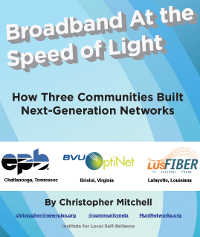Image


Provo started building their own municipal network in 2004 because they decided that providing access to high speed connectivity was important to their community’s future. In 2011, they started looking for a partner that could acquire their network and deliver an affordable service for Provoans. We’re committed to keeping their vision alive, and, if the deal is approved and the acquisition closes, we’d offer our Free Internet service (5 Mbps speeds) to every home along the existing Provo network, for a $30 activation fee and no monthly charge for at least seven years. We would also offer Google Fiber Gigabit Internet—up to 100x faster Internet than today’s average broadband speeds—and the option for Google Fiber TV service with hundreds of your favorite channels. We’d also provide free Gigabit Internet service to 25 local public institutions like schools, hospitals and libraries.
 We continue to be excited that Google's investments in fiber access networks have changed the paradigm regarding access to the Internet. Those efforts have awakened the media to the pioneering work already being done in communities like Chattanooga, Lafayette, Bristol, Morristown, and many others (including Clarksville now). And we will continue to advocate for communities safeguarding their self-determination by having a measure of ownership over the networks on which they depend.
There is no doubt that communities are foolish to depend on distant national cable and DSL companies to build the next generation of Internet networks.
And don't be fooled by these two quick annoucements -- Google takes many months to negotiate agreements with local governments like Austin, Kansas City, and Provo. I would not be surprised to see another announcement or two in 2013, but would be surprised to see more than a handful more. Communities need to make their own plans, not hope for an outside entity to rescue them.
For cities that don't want to get into offering services, we have been identifying communities that have made smart investments in partnerships with other providers or on an open access basis -- see Danville, Palm Coast, Mount Vernon, Indianola, Princeton (IL), Cortez, and many others on our map of community-owned networks.
We continue to be excited that Google's investments in fiber access networks have changed the paradigm regarding access to the Internet. Those efforts have awakened the media to the pioneering work already being done in communities like Chattanooga, Lafayette, Bristol, Morristown, and many others (including Clarksville now). And we will continue to advocate for communities safeguarding their self-determination by having a measure of ownership over the networks on which they depend.
There is no doubt that communities are foolish to depend on distant national cable and DSL companies to build the next generation of Internet networks.
And don't be fooled by these two quick annoucements -- Google takes many months to negotiate agreements with local governments like Austin, Kansas City, and Provo. I would not be surprised to see another announcement or two in 2013, but would be surprised to see more than a handful more. Communities need to make their own plans, not hope for an outside entity to rescue them.
For cities that don't want to get into offering services, we have been identifying communities that have made smart investments in partnerships with other providers or on an open access basis -- see Danville, Palm Coast, Mount Vernon, Indianola, Princeton (IL), Cortez, and many others on our map of community-owned networks.